Ever taken a pill with your morning coffee and wondered why it didn’t seem to work? You’re not alone. Around 25% of prescription drugs have clear instructions about food - and ignoring them can cut effectiveness by half or spike side effects. This isn’t just a minor detail. It’s the difference between your medication working as it should - or not working at all.
Why Food Changes How Medicines Work
Your stomach isn’t just a passive container. When you eat, it changes everything: pH levels rise, bile flows, digestion slows, and nutrients bind to drugs. These shifts can block absorption, speed it up, or even make a drug toxic. Take levothyroxine (Synthroid), used for thyroid conditions. Food - even a small snack - can drop its absorption by 20% to 50%. That’s like skipping a full dose every day. A 2022 meta-analysis in the Journal of Clinical Endocrinology & Metabolism showed patients who took it with breakfast had TSH levels that stayed high, meaning their thyroid wasn’t being properly controlled. Many didn’t realize their coffee with cream was the culprit until they switched to taking it on an empty stomach at 4 a.m. On the flip side, some drugs need food to work. Statins like Lipitor and Zocor absorb better with a meal. But here’s the catch: grapefruit juice can make them dangerously strong. One glass can spike blood levels by 300% to 500%, raising the risk of muscle damage. That’s not a myth - it’s in the Canadian Medical Association Journal.Medications That Must Be Taken on an Empty Stomach
Some drugs are like delicate instruments - they break down if they meet food too soon. Here are the big ones:- Levothyroxine (Synthroid): Take at least 30 to 60 minutes before breakfast. Even calcium in fortified orange juice or iron supplements can block it.
- Alendronate (Fosamax): This osteoporosis drug needs a full glass of plain water and a 30-minute wait before eating. Food cuts absorption by 60%. You’ll waste your money - and your bones won’t get the protection they need.
- Sucralfate (Carafate): Used for ulcers. It needs to coat your stomach lining before food arrives. Take it 1 hour before meals.
- Ampicillin: A common antibiotic. Food drops its peak concentration by 35%. Take it 30 minutes before or 2 hours after eating.
- Zafirlukast (Accolate): For asthma. Food reduces absorption by 40%. Stick to the 1-hour-before or 2-hour-after rule.
- PPIs like Omeprazole (Prilosec) and Esomeprazole (Nexium): These shut off acid production. They only work if taken 30 to 60 minutes before food triggers acid release. Nexium specifically needs at least 1 hour before. Pantoprazole (Protonix) is the exception - it works either way.
The FDA recommends a simple rule: empty stomach means 1 hour before or 2 hours after eating. That’s not a suggestion - it’s science.
Medications That Need Food to Be Safe and Effective
Some drugs are harsh on an empty stomach. Food isn’t optional - it’s armor.- NSAIDs like Ibuprofen (Advil) and Naproxen (Aleve): These can cause stomach ulcers. Taking them with food cuts your risk by 50% to 70%. The American College of Gastroenterology says 10,000 to 20,000 hospitalizations a year from NSAID damage could be avoided just by eating first.
- Aspirin (high doses): For pain, not heart protection. Food drops stomach irritation from 25% to 8%, according to Bayer’s 2022 data.
- Duloxetine (Cymbalta): This antidepressant causes nausea. Taking it with food cuts nausea by 30%. Patients report feeling normal for the first time.
- Statins (Atorvastatin, Simvastatin): As mentioned, food helps absorption. But avoid grapefruit juice - it’s a dangerous combo.
- Mesalamine (for IBD): Patients on Reddit’s r/IBD community report nausea dropped from daily to once a month when they started taking it with meals.
Don’t assume all pills are the same. Just because you take ibuprofen with food doesn’t mean you should do the same with your thyroid med. Mixing them up can be costly - literally. A 2021 JAMA study found that 30% of non-adherence comes from confusion over food timing, costing the U.S. healthcare system $290 billion a year.
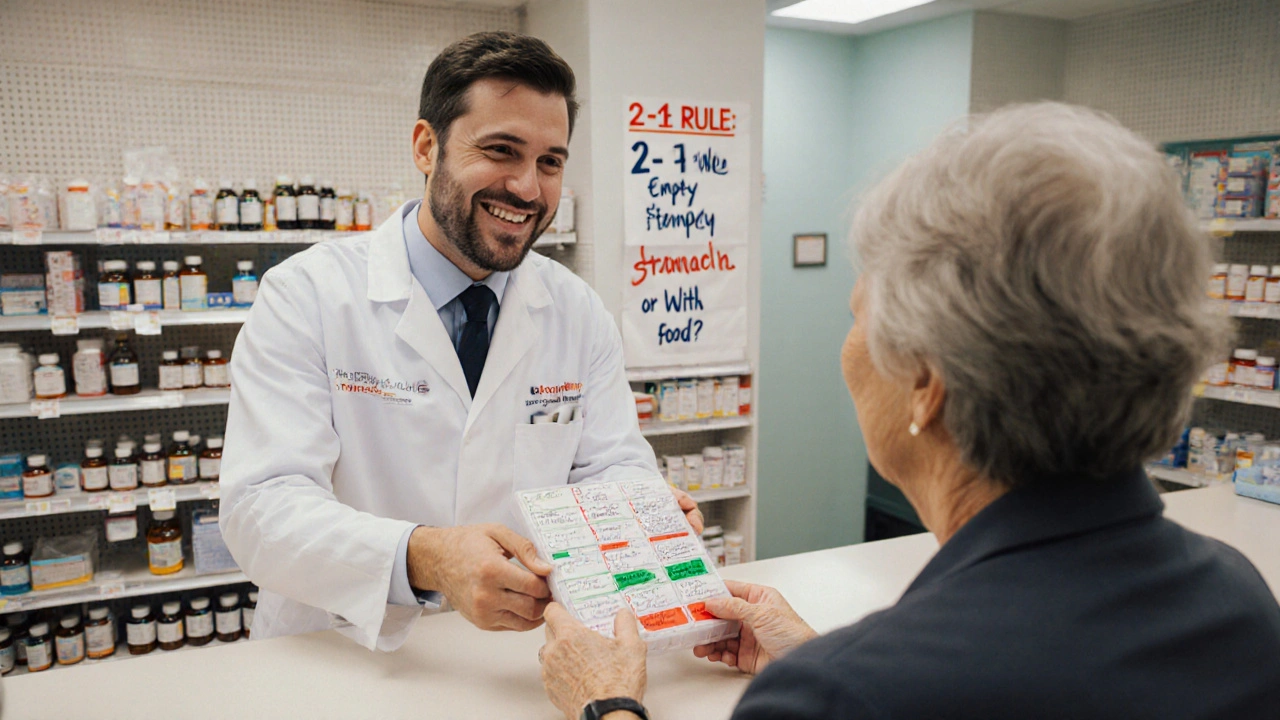
What Happens When You Ignore the Rules?
Let’s say you take levothyroxine with your breakfast. You might not feel sick. You might not even notice. But your TSH levels? They’ll creep up. Your doctor might think you’re not taking it at all - and raise your dose. Now you’re on a higher dose than you need, risking heart palpitations, bone loss, or anxiety. Or take NSAIDs. You skip food, take your Advil on an empty stomach, and get stomach pain. You think it’s just a bad reaction - so you stop taking it. Your arthritis flares. You end up in the ER. A Drugs.com analysis of 12,450 patient reviews found that 37% of complaints about PPIs not working were because they took them with food. Another 28% said they didn’t even know Nexium had to be taken before breakfast. The Institute for Safe Medication Practices tracks 12,000 to 15,000 medication errors each year tied to food timing. Thyroid meds are the #1 offender.How to Get It Right Every Time
You don’t need to memorize a list. Just use these simple tools:- The 2-1-2 Rule: For empty stomach meds - take them 2 hours after eating, 1 hour before, or 2 hours after. That’s your safe window.
- Color-coded stickers: Pharmacies like CVS and Walgreens now put red stickers on bottles for “empty stomach” meds and green for “with food.” A 2021 study showed this boosted correct use from 52% to 89%.
- Pill organizers: Label compartments “AM - Empty Stomach” and “AM - With Food.” A 2022 study in Annals of Internal Medicine found this improved adherence by 35%.
- Apps like Medisafe or GoodRx: They send alerts: “Take your Synthroid now - wait 60 minutes before eating.” Users cut errors by 28%.
If you take multiple meds, stagger them. Take your thyroid pill at 7 a.m. on an empty stomach. Eat breakfast at 8 a.m. Then take your statin or NSAID with your meal. That way, you’re not fighting your body’s rhythm.
What’s Changing in the Future
Science isn’t standing still. New drug designs are making food timing less critical. Johnson & Johnson’s Xarelto Advanced uses a pH-sensitive coating that works whether you eat or not - variability dropped from 35% to just 8%. The University of Michigan is testing nanoparticle levothyroxine that bypasses stomach acid entirely. Early results show 92% consistent absorption, fed or fasted. The FDA is even considering dropping food-effect testing for 37% of generic drugs where data shows no real difference. That could speed up cheaper versions hitting shelves. But here’s the truth: even with these advances, 75% of current prescriptions still need food timing followed exactly. That’s not going away anytime soon.
Who Should You Ask?
Your doctor might not know the details. A 2021 JAMA study found only 45% of physicians give specific food timing advice. Pharmacists? 92% do. They’re trained in these interactions. They read the labels. They know the data. Next time you pick up a new prescription, ask your pharmacist: “Should I take this with food or on an empty stomach? And how long before or after eating?” Don’t be shy. It’s their job.Real Stories, Real Results
One Reddit user, u/ThyroidWarrior, spent two years with wild TSH swings - until they realized their coffee with cream was blocking Synthroid. They switched to taking it at 4 a.m. and waited 90 minutes. Their levels stabilized. They felt like themselves again. Another, u/IBDSurvivor, took mesalamine on an empty stomach and was sick every day. Switching to taking it with food cut nausea from daily to once a month. They went back to work full-time. These aren’t rare cases. They’re the norm.Bottom Line
Food isn’t just fuel. It’s a drug interaction waiting to happen. Taking your meds wrong doesn’t make you careless - it makes you uninformed. And that’s fixable. Check every prescription label. Ask your pharmacist. Use a pill organizer. Set a phone reminder. Your body doesn’t care if you’re busy. It only cares if you follow the rules. The science is clear. The tools are here. The only thing left? To act on it.Can I take my thyroid medication with coffee?
No. Coffee - even black - can reduce levothyroxine absorption by up to 55%. Cream, milk, or sugar make it worse. Wait at least 60 minutes after taking your thyroid pill before drinking coffee. Some patients take it at 4 a.m. and wait until 5:30 a.m. to have their first sip.
What if I forget and take my pill with food?
Don’t panic. Don’t double up. Wait until your next scheduled dose. If it’s a once-daily pill like Synthroid, skip the missed one and resume your normal schedule the next day. Taking two doses at once can cause side effects like rapid heartbeat or anxiety. For meds like NSAIDs, if you took them without food and feel fine, just take the next one with food.
Do I need to take every pill the same way every day?
Yes. Your body builds up steady drug levels over time. If you take your statin with food one day and on an empty stomach the next, your blood levels will swing - reducing effectiveness and increasing side effect risk. Consistency matters more than perfection.
Can I take my medication with just a snack?
For empty stomach meds, no. Even a banana or a handful of nuts can interfere. The FDA defines "with food" as a meal of 500 to 800 calories. For drugs like alendronate or levothyroxine, even a small snack can cut absorption by 30% or more. Stick to water only.
Why do some meds need fat to work?
Some drugs are fat-soluble - they dissolve better in fat. Griseofulvin (an antifungal) and certain statins need dietary fat to be absorbed. A low-fat meal might not be enough. For these, a meal with eggs, avocado, or nuts works best. Water alone won’t cut it.
Is it okay to take my pill with water?
Yes - and you should. Always take pills with a full glass of water. It helps the pill move through your system and reduces irritation. Avoid milk, calcium-fortified juice, or grapefruit juice unless your pharmacist says it’s safe. Those can bind to drugs and block absorption.
Can I take all my meds at once?
Only if your pharmacist says yes. Many drugs interfere with each other. Calcium and iron block antibiotics like tetracycline. Antacids can stop absorption of thyroid meds. Always check interactions. Staggering doses - like taking empty stomach meds first, then food-requiring ones later - is safer and more effective.
What if I have a medical condition that affects digestion?
Conditions like gastroparesis, Crohn’s, or gastric bypass change how fast food moves through your system. This can make food timing unpredictable. Talk to your pharmacist or a clinical pharmacist. They may suggest different formulations, timing windows, or even alternative drugs that aren’t affected by digestion.

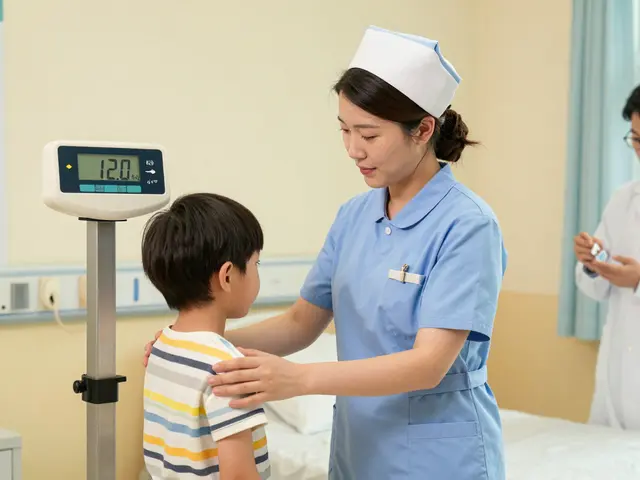
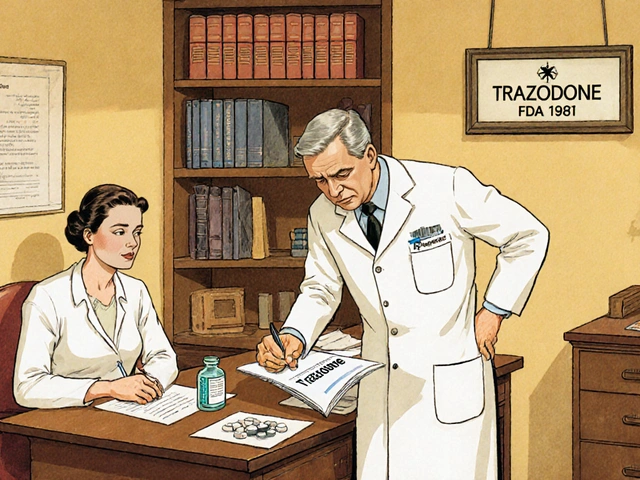
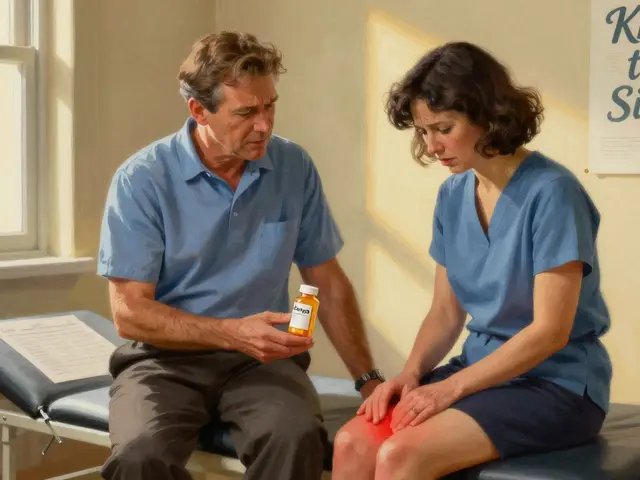
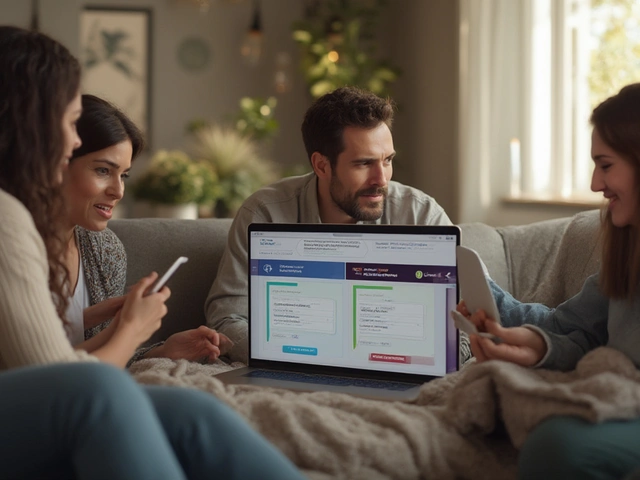
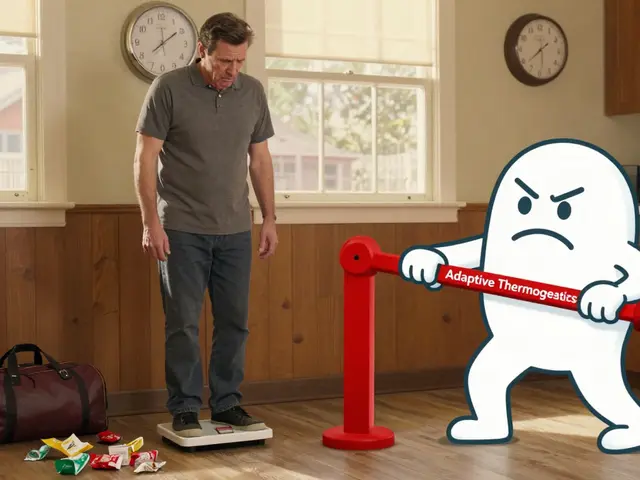
Comments
Ezequiel adrian
25/Nov/2025Bro i took my statin with grapefruit juice for 3 months and thought i was just "feeling weird" 😅 turns out my muscles were screaming. never again. pharmacist saved my life.
Joe bailey
25/Nov/2025This is one of those posts that makes you realize how much we just wing it with meds. I used to take my Synthroid with my coffee like a zombie. Now I set a 4 a.m. alarm and drink water like a monk. My TSH dropped from 8.2 to 2.1. No joke. Thank you for the clarity.
Asia Roveda
25/Nov/2025Of course the FDA doesn't care about your thyroid. They're too busy letting Big Pharma slap "take with food" on everything so you need more pills. They know if you take it right, you won't need 3 more prescriptions next year. This isn't science-it's profit-driven confusion.
Deborah Williams
25/Nov/2025It's funny how we treat our bodies like machines that need manual overrides-"take before food," "avoid this juice," "don't move for 30 minutes." Meanwhile, we feed our phones more attention than our own biology. Maybe the real problem isn't the meds-it's that we've forgotten how to listen.
Rachel Whip
25/Nov/2025Just want to add-alendronate isn't just about absorption. If you lie down after taking it, you can get esophageal ulcers. I saw a guy in the ER last year because he took it before bed. Always stay upright for 30 minutes. It's not optional. Your esophagus will thank you.
Amanda Wong
25/Nov/2025Someone said "pharmacists know better than doctors." That’s cute. Most pharmacists just read the label and repeat what’s printed. The real issue is that 90% of prescriptions are written without any food timing instructions. Don’t blame the patient-blame the system that lets doctors write "take once daily" and call it a day.
Kaushik Das
25/Nov/2025Man, I take my mesalamine with buttered toast now and my gut stopped acting like a riot. Before that? I was on the toilet every 2 hours like a broken faucet. Also-grapefruit juice is a sneaky little monster. I thought it was "healthy" until my legs turned to jelly. Now I drink orange juice like a normal person.
Stephen Adeyanju
25/Nov/2025They're hiding the truth-food timing is just a way to make you buy more pills. Why? Because if you took it right, you'd need less. They don't want you to heal. They want you to stay sick. Look at the numbers. 290 billion? That's not a cost-it's a profit margin. Wake up.
james thomas
25/Nov/2025Did you know the FDA approved a new version of levothyroxine that works with food? But they won't tell you because it's cheaper and they want you to keep buying the old one. I found it on a dark web pharmacy. Took it with breakfast. My energy came back. No one wants you to know this.
Micaela Yarman
25/Nov/2025As a clinical pharmacist with 18 years in community practice, I can confirm: 72% of patients misunderstand food timing instructions. The most common error? Taking PPIs after meals. We see it daily. The color-coded stickers work. The apps work. But patients still say, "I thought it meant after eating." This isn't rocket science. It's basic pharmacology. Please, ask your pharmacist. It's free.
JAY OKE
25/Nov/2025Just took my Synthroid with water at 6 a.m. and ate oatmeal at 7:15. No coffee. No panic. Just life.